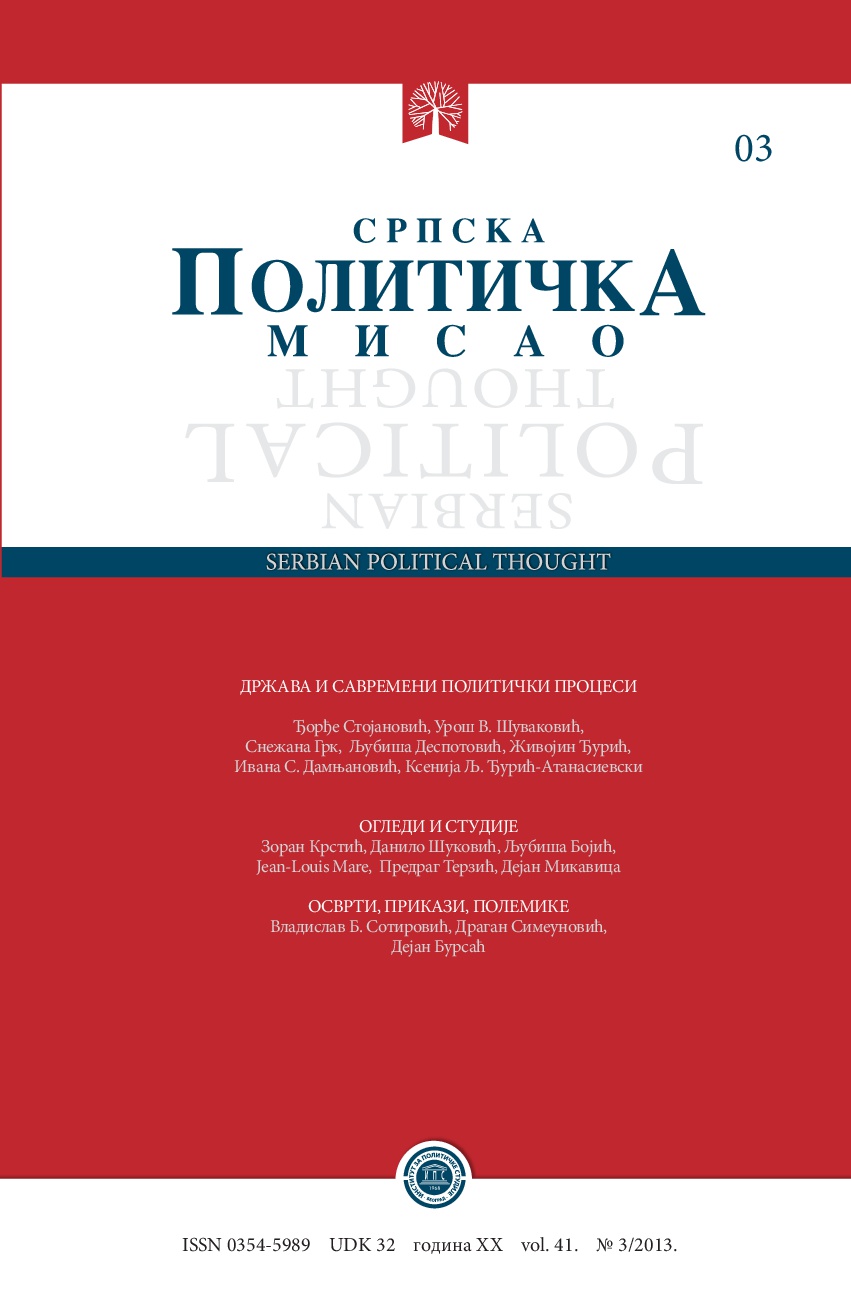Комуницирање и демократија у 21. bеку
Communication and Democracy in the 21st Century
Author(s): Ksenija Đurić-AtanasievskiSubject(s): Media studies, Recent History (1900 till today), Government/Political systems, Politics and communication, Social Norms / Social Control, ICT Information and Communications Technologies
Published by: Институт за политичке студије
Keywords: communication; information and communication technology; the Internet; democracy; public opinion; new media; social media;
Summary/Abstract: Present day communication creates opportunity to develop participatory model of democracy. Its dominant characteristics are interaction and ability to present individual content and opinion in public sphere. New ways of communication through computers and global network enable greater number of community members to provide their comments and take part in forming public opinion. Information and communications technology allows innovation in traditional media, creation of new forms and produces unlimited amount of information from the political sphere for broad range of users. This in turn enables more informed political choice in democratic society and articulation of prevailing public opinion on broad social issues. Certain examples of forming public opinion, such as was the Arab Spring, revealed the importance and democratic potentials of these new use of media. These social movements increase the responsibilities of politicians in developed democracies, and more importantly present new ways of using media in the process of democratisation of some societies. However, a creation of new ways of communication in a society does not necessarily indicate that a qualitative progress in improving democratic parameters has been achieved. There are still problems related to the technical component of the communication based on computer technology: limited accessibility for some users who are not proficient, but also overload of often unreliable and no quality information. The other type of problems is related to the users of new and innovative means of communication who are the subject of democratic communication at the same time. A citizen must be motivated to search for the information needed for his/her role of an political individual and must show interest in social role of his/her being. The new way of communication reveals that Internet users can be separated and locked out by filtering information and opinions that reflects previous stands, not by ex- change of ideas that would produce productive attitudes and true public opinion. These new way of communication are abundant in negative and extremists views and bigoted polarisation that are miles away from public discussions on all- important social issues and Price’s conversion of media audience to the public. Anonymity reduces the responsibility of the negative effects that written word may have on other people. As widely acknowledged, communication through social media has also been exposed to manipulation and mismanagement. In addition, democratic potential of internet and new media have been marginalised by the way modern governments use these new technologies. Some research has confirmed that the most prevailing model of interaction between government and citizens is more commanding than consultative and inclusive. Governments still use Grunig’s model of public information that aims to distribute information for which feedback is not sought and which supposed to influence the public to support the interest of the organisation it represents. Informational technologies and the types of communications they enable can contribute significantly to democratic processes if some simple rules are obeyed such as: promotion of public debate and behaviour, forming of public discourse not focus on the private one, respect for social norms and ethics and responsibility for written publications. Every successful manifestation of virtual public that is democratic or just advocating democracy confirms the importance and usefulness of the global network and its products for the strengthening of democracy. Such manifestation are not rare globally any more but they may be susceptible to mismanagement and abuses which does not support democracy. The advantage of informational technology and new ways of communication between communities are beneficial to the Serbian society as much as this technology is being developed and becoming informational. But, how much it can contribute towards democratic processes in Serbia? Electronic versions of traditional media offer more opportunity for interaction and in addition to that, more citizens of Serbia use social network. However, there are some impediments in all these parameters of the use of the new ways of communication in Serbian democracy – complex socio- economic environment that threaten traditional media and influence the use of the global network, non- existence or disrespect for public debate or hiding behind anonymity that breeds extremism. Perhaps the most important flaw in the Serbian political life is the lack of support for consultative and participatory model of communication with the public. Instead, indirect information through traditional media still prevails and this is subjected to various non-media influences of the political elite and private businesses. Further investigation of the Serbian political scene should examine current use of new technologies for enabling two way communications between power holders and citizens as it is the precondition for democratic development. There is also a need to analyse positive examples of respectful and responsible treatment of prevailing opinion of the majority by decision makers.
Journal: Српска политичка мисао
- Issue Year: 2013
- Issue No: 3
- Page Range: 129-145
- Page Count: 17
- Language: Serbian

